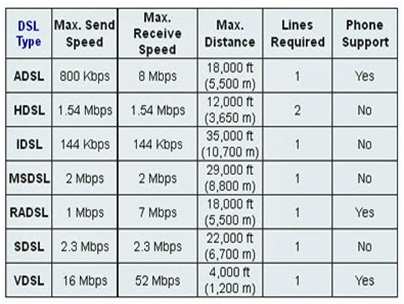Which xDSL flavour, appropriate for home or small offices, delivers more bandwidth downstream than upstream and over longer distance?
A. VDSL
B. SDSL
C. ADSL
D. HDSL
A. VDSL
B. SDSL
C. ADSL
D. HDSL
Correct Answer: C
Explanation:
Asymmetric digital subscriber line (ADSL) is designed to provide more bandwidth downstream (1 to 8 Mbps) than upstream (16 to 800Kb). DSL (Digital Subscriber Line) is a modem technology for broadband data access over ordinary copper telephone lines (POTS) from homes and businesses. xDSL refers collectively to all types of DSL, such as ADSL (and G.Lite), HDSL, SDSL, IDSL and VDSL etc. They are sometimes referred to as last-mile (or first mile) technologies because they are used only for connections from a telephone switching station to a home or office, not between switching stations.
xDSL is similar to ISDN in as much as both operate over existing copper telephone lines (POTS) using sophisticated modulation schemes and both require the short runs to a central telephone office
Graphic below from: http://computer.howstuffworks.com/vdsl3.htm

DSL speed chart The following are incorrect answers: Single-line Digital Subscriber Line (SDSL) deliver 2.3 Mbps of bandwidth each way.
High-rate Digital Subscriber Line (HDSL) deliver 1.544 Mbps of bandwidth each way.
Very-high data-rate Digital Subscriber Line (VDSL) can deliver up to 52 Mbps downstream over a single copper twisted pair over a relatively short distance (1000 to 4500 feet). Reference used for this question:
http://computer.howstuffworks.com/vdsl3.htm and http://www.javvin.com/protocolxDSL.html and KRUTZ, Ronald L. & VINES, Russel D., The CISSP Prep Guide: Mastering the Ten Domains of Computer Security, John Wiley & Sons, 2001, Chapter 3: Telecommunications and Network Security (page 115).
xDSL is similar to ISDN in as much as both operate over existing copper telephone lines (POTS) using sophisticated modulation schemes and both require the short runs to a central telephone office
Graphic below from: http://computer.howstuffworks.com/vdsl3.htm

DSL speed chart The following are incorrect answers: Single-line Digital Subscriber Line (SDSL) deliver 2.3 Mbps of bandwidth each way.
High-rate Digital Subscriber Line (HDSL) deliver 1.544 Mbps of bandwidth each way.
Very-high data-rate Digital Subscriber Line (VDSL) can deliver up to 52 Mbps downstream over a single copper twisted pair over a relatively short distance (1000 to 4500 feet). Reference used for this question:
http://computer.howstuffworks.com/vdsl3.htm and http://www.javvin.com/protocolxDSL.html and KRUTZ, Ronald L. & VINES, Russel D., The CISSP Prep Guide: Mastering the Ten Domains of Computer Security, John Wiley & Sons, 2001, Chapter 3: Telecommunications and Network Security (page 115).